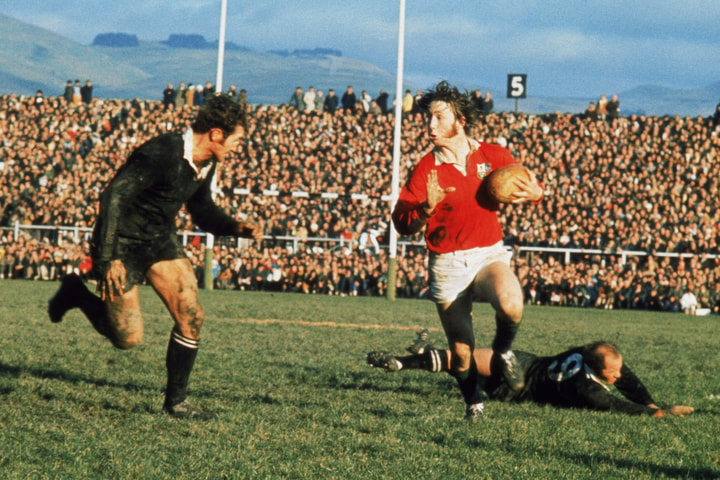
18 January 2026


During the Great War, Captain Wyndham Williams RAMC kept a diary of his experiences as a medical officer on the Western Front. In August 1916, he was on duty at a casualty clearing station when one of the wounded caught his eye. Captain Williams, from Nantymoel in south Wales, was a keen follower of rugby, so it is perhaps not surprising that he immediately recognised the casualty as one of the heroes of the Welsh victory over New Zealand in 1905. After all, he had been at the Arms Park that day. It is interesting, however, that, "Charlie" Pritchard is the only patient mentioned by name in Captain Williams's diary, although he must have treated thousands of casualties during the war. This shows the extent of Charlie's fame and popularity. Charlie Pritchard was certainly one of the greatest forwards of his era and, arguably, he was one of the finest ever to represent Wales. A vigorous and courageous player, he was also highly regarded in rugby circles for his genial, warm-hearted and sporting nature.
Between 1904 and 1910, he won fourteen caps for Wales, though injuries cost him at least ten more. He played in the Triple Crown teams of 1904-5 and 1907-8 when Wales also recorded the first ever Grand Slam. However, it was his total and unflagging commitment in the 3-0 defeat of New Zealand for which he is best remembered. His devastating tackling in this gruelling match was acknowledged by the press as crucial to the Welsh victory. Charlie was "always in the thick of the fight" that day when he performed "prodigies of aggressive defence" for Wales. Born in 1882 into a sporting family in Newport, he learned the game, however, in England when he boarded at Long Ashton School, Bristol. After school, he took up work in the family wine and spirit business and, at only nineteen, he was invited to play for Newport in an especially tough away game against the then Welsh champions, Swansea. So impressive was he on his debut in the hard fought Newport victory that, from then on, he became a permanent member of the Newport pack. He played in well over two hundred matches for the club between January 1902 and April 1911, and was a popular captain for three consecutive seasons though he was injured for much of that time. A physically dominant presence on the field, he was described as the "Uskside Adonis", by the irrepressible Percy Bush, the Wales fly-half in the New Zealand match. Charlie was a vigorous and resolute forward who always committed himself totally during matches. His reputation as a tackler was fearsome, yet he was also widely admired for his chivalrous approach to the game and it was said of him that he was never guilty of foul play during his entire career.
In May 1915, he was commissioned second lieutenant in the 12th Battalion (3rd Gwent) The South Wales Borderers. They went on active service in June 1916, and gained their first experience of trench warfare near Béthune. It has often been claimed (especially during the 2016 commemorations) that Charlie died in the Battle of the Somme. However, he never served on the Somme and he died, and is buried, over thirty miles to the north. On the night of 12th August 1916, Charlie ̶ now promoted to captain ̶ was in command of a strong raiding party who had been given instructions to capture a prisoner. Charlie was wounded before reaching the enemy trench but he refused to stop. Moreover, he arrived at the trench first and jumped in and grabbed a prisoner. After scrambling out with him, he then ordered his men back but was wounded again, this time much more seriously. He was forced to hand the prisoner over, and two comrades then managed with great difficulty to carry Charlie back to safety. Now in a state of collapse, he asked "Have they got the Hun?" When told they had, he replied, "Well, I have done my bit". He was then stretchered out of the line and taken to the Casualty Clearing Station at Chocques, a few miles behind the front. Despite the ministrations of Captain Wyndham Williams and his medical colleagues, it was here that, on the 14th August 1916, Charlie Pritchard died of his wounds. The 12th South Wales Borderers War Diary recorded, "The Battalion thus loses a very gallant officer and a chivalrous, generous and large minded gentleman."
It was later announced that, had he survived, Charlie would have been recommended for the Distinguished Service Order for his bravery. Only the Victoria Cross was a higher gallantry award but at that time the DSO could not be awarded posthumously. So he never received the decoration he so richly deserved. When he heard the news, a distraught WJ Townsend Collins, a journalist who knew Charlie well, wrote movingly, "The war has swept away many a great and famous Rugby player who was also a good fellow; but among them all was none with a stouter or kinder heart, more beloved, more lamented than Charlie Pritchard." Captain Charles Meyrick Pritchard is buried in Chocques Military Cemetery, three miles north-west of Béthune. I should like to thank Clive Lougher, the grandson of Wyndham Williams, for allowing me to make use the information in his grandfather's diary.

About the Author - Gwyn Prescott is a Cardiff based rugby historian and writer. His latest book 'Call Them to Remembrance': The Welsh Rugby Internationals who Died in the Great War is available through publishers St. David's Press and from Amazon.
Follow the World Rugby Museum on Facebook, Twitter and Instagram.